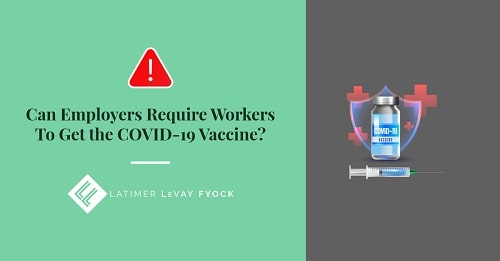Employers Can Require Workers To Get the COVID-19 Vaccine, Subject to ADA and Religious Concerns

The pace of COVID-19 vaccinations is picking up speed, with millions of Americans getting their shot each day. But not everyone is on board. Polls show that a significant number of people remain skeptical about the vaccine or are refusing to get inoculated against the virus.
Certainly, the government can’t force anyone to take a vaccine against their wishes. But many vaccine-averse workers will soon discover that, in most cases, their employer can require vaccination as a condition of continued employment.
According to guidance from the Equal Employment Opportunity Commission (EEOC), American employers will be well within their rights to terminate or refuse to hire individuals who don’t get the COVID-19 vaccine, except when doing so would violate the Americans With Disabilities Act (ADA) or infringe on an employee’s sincerely held religious beliefs.
Employers Can Exclude From The Workplace Unvaccinated Employees Who Are a "Direct Threat" to Other Employees
In its guidance, the EEOC does not explicitly say that mandatory vaccination is lawful. That’s because it doesn’t need to. Since most Illinois employees work on an "at-will" basis, their employer can terminate them for almost any reason not expressly prohibited by an employment contract, collective bargaining agreement, or federal, state, or local laws. Generally, no such laws stand in the way of an employer mandating that their workforce get vaccinated against COVID-19.
As the EEOC notes in its guidance, an employer can make an employment offer or continued employment conditional on the employee not posing “a direct threat to the health or safety of individuals in the workplace." This can include requiring an employee to get a vaccination.
However, if a vaccination mandate screens out or tends to screen out an individual with a disability whose condition makes vaccination a threat to the individual’s health (such as a compromised immune system or an allergy to the vaccine), the employer must take additional steps before they can take an adverse employment action against the individual.
Specifically, an employer must demonstrate that the presence of the unvaccinated worker in the workplace would create a "significant risk of substantial harm to the health or safety of the individual or others that cannot be eliminated or reduced by reasonable accommodation,” such as remote work or a leave of absence.
To determine whether an unvaccinated employee represents such a "direct threat," the EEOC advises employers to conduct an "individualized assessment" of these four factors:
- The duration of the risk.
- The nature and severity of the potential harm.
- The likelihood that the potential harm will occur.
- The imminence of the potential harm.
The EEOC stated that "A conclusion that there is a direct threat would include a determination that an unvaccinated individual will expose others to the virus at the worksite.”
Employers Must Fulfill Their "Reasonable Accommodation" Obligations Under The ADA
However, even where there is a “direct threat,” an employer must still comply with the ADA’s obligations to make "reasonable accommodation" for those whose disability poses a barrier to vaccination. A company cannot exclude an employee from the workplace for not getting vaccinated "unless there is no way to provide a reasonable accommodation (absent undue hardship) that would eliminate or reduce this risk so that the unvaccinated employee does not pose a direct threat."
Sincerely Held Religious Beliefs
In addition to the protections afforded by the ADA, the anti-discrimination provisions of Title VII of the Civil Rights Act of 1964 may shield a worker from employer-mandated vaccination if the shot would run afoul of their "sincerely-held religious beliefs.” Such beliefs would not include non-religious personal or political views, including unfounded fears of the vaccine or other such “anti-vaxxer” sentiments. The burden falls on the employee to demonstrate the legitimacy and basis of their religious objections to the vaccine.
Just as those with disabilities must receive “reasonable accommodation” in the face of a vaccination mandate, employees who meet their burden under Title VII must be afforded the same. An employer must make accommodations for employees with a religious objection to vaccination unless doing so would cause "undue hardship."
However, it is much easier for employers to show "undue hardship" for purposes of Title VII than it is under the ADA. All an employer must show for a burden to be “undue” is that it is that imposes upon it "more than a de minimis cost or burden.”
Additional Considerations
One of the biggest challenges facing business owners as the pandemic (hopefully) wanes is the desire, expectation, or demand of employees who spent the past year working remotely to continue to do so. This may include telecommuting workers who do not want the vaccine and argue that they should not be forced to get it because they work from home and are therefore not a threat to anyone else’s health.
This puts employers in a tricky spot. There are multiple considerations an employer should take into account when potentially ordering employees back to in-person work. Any decision is likely to have a substantial effect on morale, productivity, and employees who have longer commutes, young children (and a lack of child-care options), and other considerations.
While very generally employers have the right to demand employees return to the office, employers should proceed with caution before issuing a blanket edict. In addition, to the extent companies are amenable to allowing some continued remote-working arrangements, they should establish clear, preferably written, criteria for who gets to work remotely and how often and apply that criteria uniformly throughout their workforce.
Contact Latimer LeVay Fyock With Your Employment-Related Vaccination Questions
Vaccination policies and practices for business owners may also raise other employment issues, such as whether employers need to compensate employees for the time they spend getting their shot. If you have questions or concerns about your obligations regarding COVID-19 vaccinations or any other COVID-19 employment issues, please reach out to your contact at Latimer LeVay Fyock.


